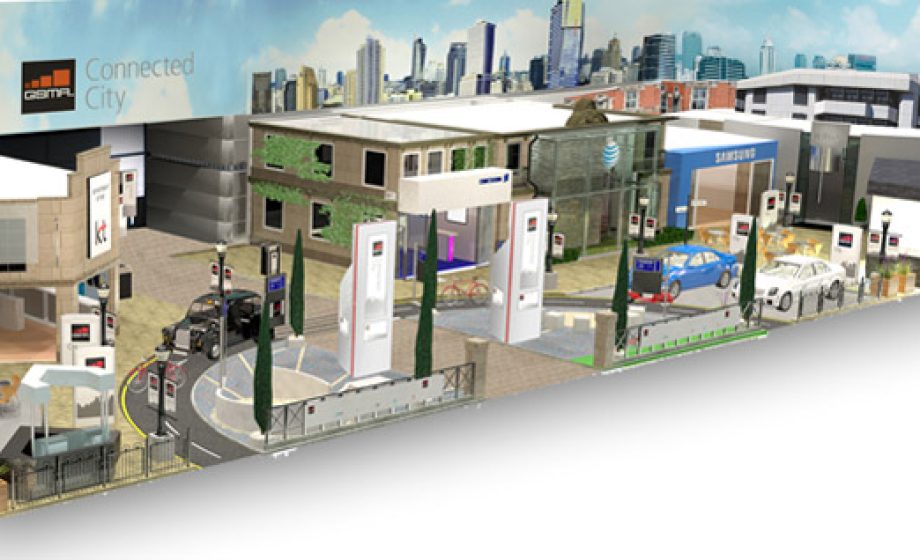
Although there was a lot going on as always, here were the most recent highlights for me at MWC:
The Connected City, one of the biggest draws at MWC
Building on the success of its Connected City exhibit which drew 15k visitors, GSMA launched an expanded version this year. Its principal partners Deutsche Telecom, AT&T, KT, Vodafone as well as other big name exhibitors such as IBM and Orange put on a pretty impressive display of their innovations that will enable the connected future.
Some of the big highlights at this years Connected City included:
- AT&T Digital Life’s mini connected home which displayed their wireless solution for home control and monitoring of alarm systems, temperature and security. The system is currently available in the US only, but they’re currently in talks with telecos to bring the solution to Europe and other non-US markets
- Deutsche Telekom and IBM’s smart stadium which will improve fan’s experiences through better management of traffic and crowd congestion, improved safety measures and enhanced facilities and their smart retail and food tracking services which will give consumers more transparency on food quality and sourcing
- Vodafone who in conjunction with BMW, Huawei, and Accenture demonstrated how their M2M solutions will enable smart retail, smart cities, connected cars and mHealth.
- They even had via Cityzen Sciences and a group of professional basketball players demonstrating the D-shirt, which allows for monitoring of the wearer’s temperature, heart rate, speed, acceleration and geolocation.
You can check-out a short video of this year’s exhibition here.
Startup Europe Manifesto – how to make it happen?
Launched last year and supported by some of Europe’s most successful entrepreneurs (e.g. founders of Spotify, Rovio, HackFwd, etc), the Startup Europe Manifesto lays out 22 key actions aimed at creating an environment for entrepreneurs to thrive and succeed and, ultimately, power growth in the EU. The Manifesto is an effort to ensure direct input from entrepreneurs and is a key component of the Startup EU initiative. While many in the startup community may be reluctant to engage with government on these issues, it’s clear as evident from what’s been going on over the last couple years that the decisions that the EU, member state and local governments make can have a big impact on entrepreneurship and innovation.
At 4YFN, organizations involved in helping to realize the goals laid out in the manifesto were on hand to discuss what’s being worked on, engage with participants via ideation workshops, and launch a call for startuppers to participate. Some of the efforts presented were the Startup Europe Partnership which, led by Mind the Bridge, which will work to help startups ‘break the glass ceiling of early stage’ by bridging the startup community with the large corporate and investment community. Another, the European Digital Forum, which will give a voice to entrepreneurs on the public policy side of the equation. Finally, they also launched a call for applications to the EU’s Web Entrepreneurs Challenge, a €10M fund to accelerate those working on ideas co-developed by several local web entrepreneurship ecosystems and hubs working together.
There’s clearly a lot of work to be done in Europe to create a more unified European tech ecosystem. But, at the very least, the EU seems to understand that involving the startup community in the effort is the only way to ensure its success.
France’s Alima takes third place in the 4YFN mobile startup competition
Out of almost 200 entries, French connected device startup Alima walked away with the third place prize on Tuesday evening. First and second place winners were, respectively, Israeli user authentication startup Cellbuddy and Spanish adaptive learning startup Infantium.
Alima, who are also currently running a campaign on Indiegogo, have launched a sleek smart device which is able to monitor and analyze the air quality in any indoor environment and sends warnings or makes recommendations and sends conditions updates right to your iPhone or Android smartphone. Being crowned as the third place winner will put them straight through to the second round Banc Sabadell BStartup program and gives them free consultation services.
Following in the footsteps of startups like Withings, it’s nice to see that France continues to stand-out in the area of connected devices.

